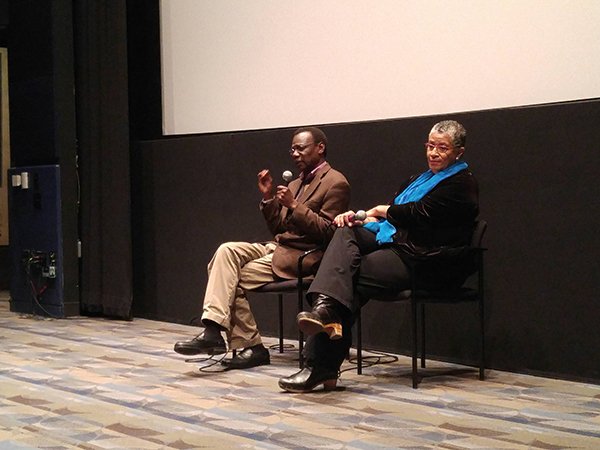Camera as “Weapon”: Emerson Introduced to “Father of African Cinema”

Mount Holyoke College professor and filmmaker Samba Gadjigo joined the Emerson and greater Boston communities for a screening and discussion of his documentary, Sembene!, about “father of African cinema” Ousmane Sembene on March 18 in the Bright Family Screening Room.
“This is a story about the power of storytelling,” Gadjigo said in the discussion.
The film is introduced through Gadjigo’s perspective as a friend and mentee of Sembene’s for many years.
In the documentary, Gadjigo describes the first time they met, when he invited Sembene to visit the United States to speak to one of his classes. When Sembene refused, Gadjigo traveled to his home in Senegal to persuade him. During the discussion following the film, Gadjigo recalled the many nights that followed of eating together, smoking, drinking beer, reading, and talking about anything and everything throughout their years of friendship.
“For me, Sembene was a teacher; he was a father figure,” Gadjigo said. “I wanted to emulate Sembene.”
In the documentary, Gadjigo visits Sembene’s home for the first time in the four years since he died in 2007, and finds rolls of film, photographs, and boxes of old documents and screenplays. He decides it is his responsibility to ensure that the work of his teacher and mentor is preserved.
“His legacy is rotting,” Gadjigo says in the film. “I cannot let this happen. I cannot let his books and films be forgotten.”
The documentary recounts how Sembene recruited locals, friends, and family members to be part of his casts and crews. His scripts were based on the real-life political corruption, cultural erasure, and oppression his country faced on a daily basis. In the documentary, Gadjigo said Sembene wanted to make films “by Africans, about Africans, for Africans.”
Although some people in the documentary described him as intimidating, abrupt, and rude, Sembene quickly became widely regarded as a revolutionary and a symbol of cultural activism. Some of his most controversial films were banned from France until they gained global attention.
According to Gadjigo, Sembene always said, “The West is my market; Africa is my audience.”
Tristan Donaldson ’17 said he enjoyed getting to know the man behind revolutionary films like Black Girl and Camp de Thiaroye better through this documentary.
“I was hoping to understand his filmmaking style better, but I did get to know the man behind it a little more,” he said. “It humanized him. He had that sense of humor, but he also had a more egotistical side from what I understand.” He continued, “You could see him in interviews and footage and actually see him in real time reacting to things and how he behaved in person in a very candid sort of way.”
During the discussion after the film, Gadjigo joked that while he and Sembene shared a passion for cinema, he was no filmmaker himself before creating this documentary.
“When I started this, I didn’t even know what a camera angle was,” he said, “and I’m not sure I do now.”
The audience asked Gadjigo questions about what he’s learned in preserving Sembene’s legacy, how he came across Sembene’s work, Sembene’s use of female characters, and what he believes is Sembene’s gift to global cinema. Gadjigo discussed the impact of colonialism on education, language, and culture, calling it the “invisible part” of colonization.
“His gift is a strong belief that culture is something we need from the crib to the shroud,” he said. “It is at the same time physical and spiritual nourishment.”
Donaldson said it is important for aspiring filmmakers to be exposed to cinema from other cultures in order to have a more well-rounded worldview.
“We get, quite literally, none of it here in America,” he said, referring specifically to African cinema. “I think understanding other people, and understanding an African perspective, and understanding a world perspective is important.”
Gadjigo also used this time to offer some words of encouragement to the aspiring filmmakers in the audience.
“All [Sembene] had was his idea and his passion,” he said. “Sembene characterized the camera as a weapon. What are you going to do with that weapon?”
Categories